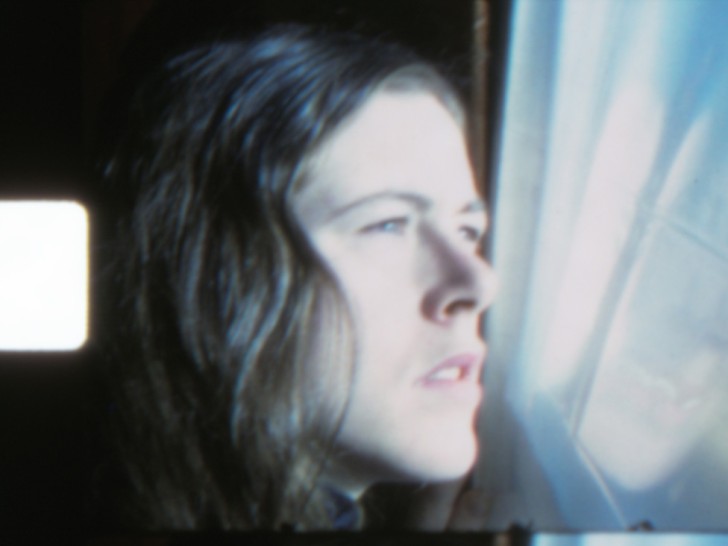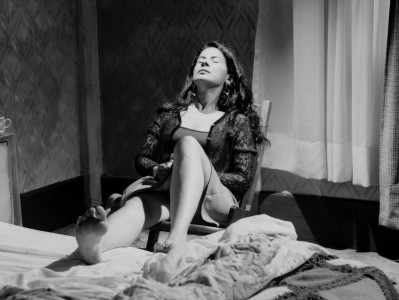
I Wanted to See How I Lived, I Wanted to Love Myself and My Past. A Tribute to Anne Charlotte Robertson, Program One with introduction by Liz Coffey and Toni Treadway.
Transcript
Liz Coffey 0:01
Hello, thank you for coming. I'm Liz Coffey. I'm the film conservator here at Harvard. I'm happy to see all of you here today for the memorial screening of Anne Robertson's films, of which you must know the titles. I'm going to read a few things that Anne wrote. Her collection came to the Harvard Film Archive last year after she passed away, and with it came a lot of paper materials and audio recordings. She was an extensive diarist in Super 8 as well as audio, paper…. If there'd been another format available to her I'm sure she would have used it.
This is a brief bio from one of her CVs: “Anne Charlotte Robertson was born in Columbus, Ohio at 3:27pm March 27, 1949. She has been making films since 1976. Her schooling includes a Bachelor of Arts magna cum laude in Art and Psychology from the University of Massachusetts, Boston, and a Master of Fine Arts with honors in Filmmaking from Mass College of Art.
She has been diagnosed as a manic depressive with schizoaffective disorder overlay, but prefers to think of herself as a typical anxious obsessive neurotic with marked tendencies for fantasy, joy and panic. She is no longer a depressive and film has been the cure, especially her work and personal documentary. Her avocation is organic gardening, which has also been a healing activity for her. Her films total more than forty-two hours running time. Her garden totals more than 5000 square feet. She believes in Super 8 film as art and therapy. Creativity and productivity are the sources of hope along with ideals and beauty.”
So all of Anne’s original Super 8 material came to the HFA We've been working on a project with the small gauge film lab Brodsky and Treadway, and I'll be introducing Toni Treadway in a second to speak as well. They are digitizing the material so that we can present it because very few of Anne's films had Super 8 prints made. Most of them she showed the original if she showed it, and that put a lot of wear and tear, and we need to protect that from happening in the future.
I'm going to read just one more thing from Anne. Anne made about three or so films, but one of them is about forty-hours long. That's the Five Year Diary. She had written a project proposal for showing it or kind of turning it into a television program, which was really I think ahead of her time. I can only think of one other—like I think An American Family might have been a similar idea. But it's too bad it didn’t get turned into TV because that would have been kind of amazing.
So this is part of her proposal: “Just before he died my father told me all you have to do with film is to tell a story. What story is most true? What documentary is most close to hand? What mystery is most personal to me? The answer to all these is: my life. I began Five Year Diary with five rolls of film and a daily costume drama about food obsession and bingeing. Gradually the film moved outside and included more and more. After two years, I began to go to graduate school in filmmaking, seeking for my roots in film, and further explorations of the technique. I graduated with this as my Masters of Arts thesis with honors. It is now thirty-seven-plus hours long and will continue all my life. Five Year Diary began inspired by my diary-making teachers and male filmmakers—Jonas Mekas and Ed Pincus and Stan Brakhage—all of whom are now some of my absolute most ardent fans. The diary continued reinspired even more by women's avant garde personal work: Carolee Schneeman, Maya Deren, Emily Dickinson, Margie Keller, Abigail Child, and most certainly Sylvia Plath in all media. Thus, the work turned from imagery to narration. Inevitably, it concentrates on both. This is not my only work. Simultaneously and before the diary's inception, I have completed thirty-one other works on film and tape and have eleven in progress, all styles and genres.”
Before I turn it over to Toni... If you didn't get one of these little flyers, you get one on the way out, but it's part of a little publication that Anne had with her MassArt thesis show which included as many hours of the diary as had been completed at that time. We will be showing more of Anne's films at Views from the Avant Garde at the New York Film Festival in October. So along with the reels of the diary that you'll see tonight and tomorrow, there'll also be Reels 9, 31, 1 and 2, and some other shorts that we haven't quite figured out which ones we're going to show yet.
So I will now introduce Toni Treadway to speak about Anne, who was a personal friend of hers as well as they work technically together at the lab. Toni Treadway.
[APPLAUSE]
Toni Treadway 5:31
Thank you. Thank you, Liz. And thank you for coming tonight. I was asked to speak for reasons that are not at all clear to me. Maybe it was because one year ago about now, I was in the room with Anne on the night that she later died, although she didn't know it at the time. But that distinction belongs to other friends in the room who were there with me and Anne and are here with us tonight, like her sister Ellen—who's here—and her sister-in-law Becky and her pastor Chris. Her brother Jeffrey is here tonight too. And in the back row with my husband and partner Bob Brodsky, her legendary teacher, mentor, fellow filmmaker, and really great cheerleader Saul Levine. So I'm glad you can all be here tonight.
I remember a year ago with astonishment, Anne’s clarity and persistence. She had a few of us write checks to pay our bills. She arranged some details about her funeral. We had a moment of prayer. Whatever her discomfort, whatever her shortness of breath, she stayed calm and focused, devout, strong, cheerful and optimistic—even seven hours before the aide called to say she'd passed. And this was characteristic, I would say over a lifetime of lots of ups and downs. Maybe I was asked to speak tonight because my partner Bob Brodsky and I have been working technically with Ann for about thirty years now to preserve the collected works. The films are mostly short, separate sound films. So this is a work with a hundred, hundred questions of how best to preserve in this so-called digital era. And we have to channel and sometimes to figure out the answers to persistent little questions during each day. Fortunately, we have history. It was Saul who sent Anne to us in the mid-80s to help make video copies because he thought she needed wider audience and a bigger distribution. It took several years of a certain kind of shyness that many people don't characterize Anne as when they see her films, but shyness before our first meetings. She showed up on our doorstep finally in a battered car held together by the widest range of political cultural bumper stickers I've seen on any car. She moved in with bags of films and audio cassettes and ripening tomatoes and fat cucumbers and mason jars of homemade pickles, astonishingly great. She and Bob struck up a cordial and sometimes even fun way of working that had Bob doing the color, choosing scene by scene on the original picture, taking sound off the edge stripe of the little Super 8 film that was recorded at the time that the film was taken, while Anne cued up audio tapes, and directed where to add the audio cassette sound, and in between, spoke her voiceover live performance into a microphone on the second track as she would in her performance screenings. We've chosen, on the works you'll see tonight, to keep the sound separate to be able to give you an experience of the original performance. We hope you will feel like at times Anne is here. She's always here with her films, but I mean really here, really narrating on top of the film. One track is the film quite often; the other track, silence or Anne. Don't be surprised when something goes to silence on one track. Hopefully this choice will play as something approaching the real experience.
Tonight we’re missing some of the extras that are performance often had for Anne: a groaning table full of film, cans, artifacts, large print signs, food, incense, whatever else made sense to her to bring I think if you look at the window outside that Brittany put together magnificently, you begin to get a feel for the kinds of things that Anne could bring to add to her performative sense of the evening.
Maybe I was asked to speak because I was around for so many swings of Anne's situation and moods and sanity and fortune but many, many people in the room tonight remember those. Who among us has not gotten a call and some of us still have them on our tape machines at home, asking for help or money or security or intervention with some agency or another, or just plain human contact, often in the most direct and appealing way, and sometimes in a really brash and pounding and unending incessant way? In the world, everything was changing for Anne all the time. Anne’s primary anchors seem to be the filmmaking and her continuing artistic output really held things together. Besides dozens of short films that Liz has talked about, and eighty-three reels, at last count, of the Five Year Diary that covered twenty years. There are 400 or so, at last count, untranscribed audio cassettes some two-hours-long and a great number of videotapes and volumes of poetry, writings, letters to the editor, letters to her senators and the Pope and other people who were in a position to do something about things she considered could be improved in the world.
Someone observed last week, we have to be glad she shot Super 8 film. The cost of the little film gauge limited her; she only got her hands on video camcorders about 1998, I think, and her output was already slowing down and she could have gone on for a long, long time with the cost of videotape being so much cheaper. I really want to sum up by saying thanks to the people at Harvard Film Archive. You are the people who will continue to get her work seen. I think Anne’s work will endure because of its core humanity. Long past our memory of any trials or tribulations or surprises in being her friend—because there always were incredible surprises—I continued to be amazed and challenged by her witness. I hope you are too. [CHOKES UP]
[APPLAUSE]
©Harvard Film Archive
Related film series

I Wanted to See How I Lived, I Wanted to Love Myself and My Past.
A Tribute to Anne Charlotte Robertson
Explore more conversations
Arturo Ripstein and Paz Alicia Garcíadiego

Eloy Enciso Cachafeiro

Valeska Grisebach

